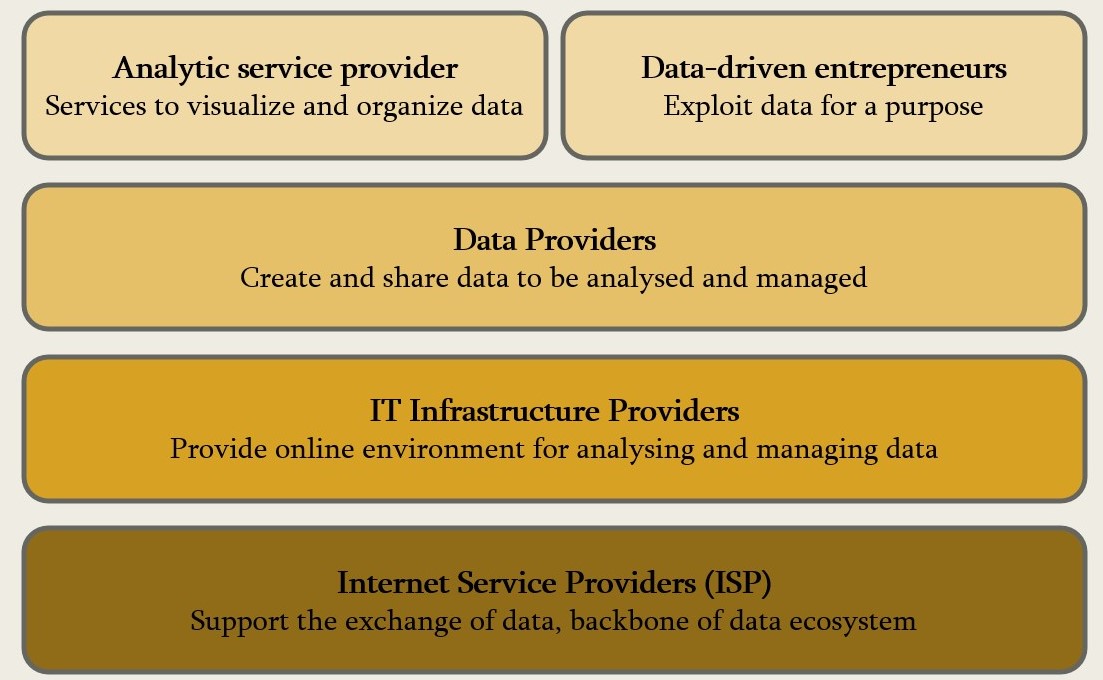Common key challenges and policies
1. Presentation (summary of p.43-54 and 69-81)
This week’s presentation was divided in two parts:
- A brief summary of the potential impacts/benefits and challenges/issues of DDI on the labour market, the scientific research sector, the health care system, the organisation of cities as well as the public sector. These challenges were connected to a series of policies to implement for the adequate implementation of DDI.
- A description of the global data ecosystem using a layer model, and of some of its actors like Internet Service Providers (ISP) and IT Infrastructure Providers.
Concerning the first part, DDI is expected to bring a lot of change to these sectors, to the point some consider to be a “creative destruction” of our current system. This implies a potential risk of increasing inequalities between jobs, companies and countries. In order to prevent this, data specialists and transition policies are needed. If adopted, DDI is expected to bring positive change to the above-mentioned sectors, such as improved and more rapid results due to more means and information about and means, more cooperation from inside and outside of the sector thanks to open databases and more transparency, a more important role for standard citizens to take part in the system, more innovation… Some obstacles still remain however, namely the question of privacy, ownership of results and data, considerable required storage, a lot of investment, current legislation, the lack of framework to make sure data can be understood by everyone (e.g. common standards, database organization) …
Concerning the second part, the global data ecosystem can be represented using the following simplified model, where the lower layers provide goods and services for the upper layers to manipulate data.
Figure 1 – Global data ecosystem
Concerning IT Infrastructure Providers, Hadoop is the most used today: it is an open-source programming framework for processing large datasets.
2. Discussion
Participants: Pere, Augustin, Meg, Masaya, Riho, Taro, Pat, and Pieng.
Date: May 19th
- In which sector do you think DDI and big data could have the best impact? (Health, administrative, cities, scientific research)
It seems that everyone was quite interested in the effect DDI could have on the public sector in every country, where there is a general impression of slow, complicated, unclear processes when administrative procedures need to be done for example. It seems like paper/hard copies of documents, information remaining within one department/office or the need to move makes procedures more complicated, especially to re-issue documents. Initiatives like the development of apps like France-Connect or eMongolia allowing citizens to access services and official documents easily and whenever needed seem to be strategic moves. It was interesting to note that eMongolia was using Google Analytics, here as a role of IT Infrastructure Provider. The creation Japanese Digitalization Ministry to provide environment and resources for digitalization also seems promising, especially to support digitalization of sectors like healthcare because medical institutions could struggle digitalizing on their own. The idea of using DDI for prevention healthcare was promising, instead of the current system focused on fixing health issues after they happen. Digitalizing the Mother-Child notebook in Japan (Health Notebook in France) could be practical, although using a physical copy also have some advantages today.
- Do you think DDI could further increase inequalities between jobs, companies of different sizes, tech companies & the others, advanced & developing countries…?
It seems that data and the use of ICT has been growing fast during everyone’s education years and that data specialist skills are expected more and more as time goes on, however the idea of having to support too much new tasks on top on their work for people initially non-specialized in data seems to be problematic. To make sure that everyone can benefit from DDI without losing their job or having to bear extra work charge, adequate policies seem essential otherwise damages could be important, blue-collar workers could lose their jobs with no other alternative for example. The transition out of coal in France could be an example to get inspiration from. Technologies like the Metaverse developed by Mark Zuckerberg were mentioned: although promising because it would remove many obstacles unavoidable in the physical world, people expect it won’t affect our daily life too much, at least in the beginning.
- Are you familiar with cloud-computing, or maybe Hadoop?
No one was familiar with it, although some people had already heard about it before.
Written by Augustin
